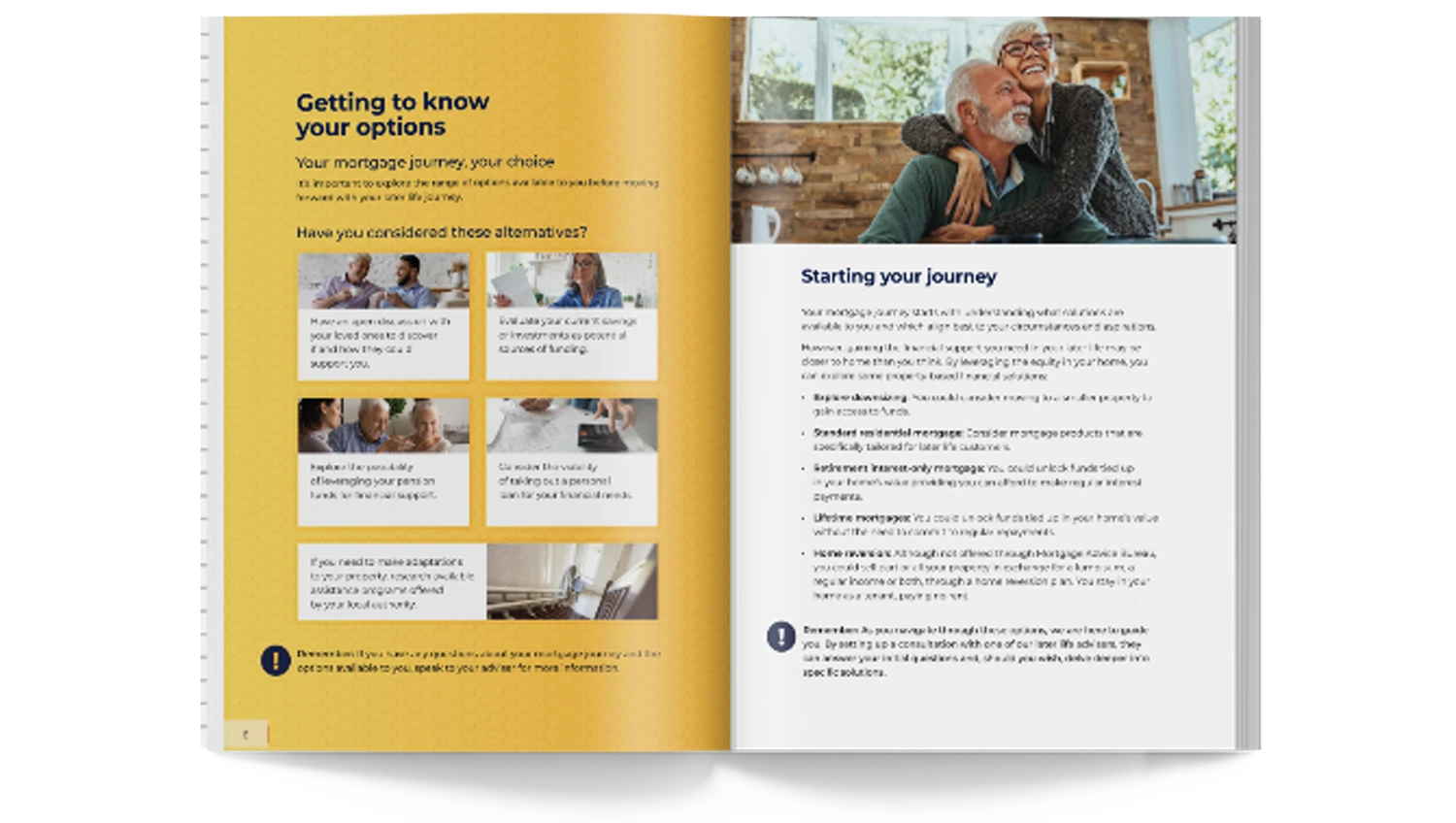Here’s what you need to know...
A lifetime mortgage can be an attractive option for those aged 55 and above (or 50 with the payment term lifetime mortgage) looking to unlock equity tied up in their home.
We’re committed to helping you make an informed decision about your home, financial future, and money.
Let’s explore the ins and outs of lifetime mortgages, including whether it’s the right choice for you.
What is the eligibility criteria?
You must be aged 50 or over, and own a home that meets the minimum requirements of a lender (typically valued at a minimum of £70,000, for example).
How much can I borrow?
The amount you can borrow is based on your age and the value of your property.
Do I have to make regular repayments?
Unless chosen otherwise, there are no monthly repayments, and interest builds up over time. The amount you owe will never exceed the property’s value.
When do I have to repay the full amount of the loan?
Typically settled when moving into long-term care or upon passing.
Want to learn more?
Download our later life guide
If you're nearing retirement or already enjoying it, our later life guide is designed to answer all your questions and provide clarity on the mortgage options tailored to your golden years.

Ready for a chat?
Book a callback
Fill in the form and one of our specialist advisers will contact you to expertly answer any questions you may have.
You can also call us directly on 03300 164386
Things to consider
You should always think carefully before securing a loan against your property.
A lifetime mortgage will reduce the value of your estate and may affect your entitlement to means-tested benefits.
Clearing an existing mortgage with a lifetime mortgage may result in higher cost of borrowing.
Mortgage Advice Bureau charges a fee for later life mortgage advice. The fee is up to £995.
Other options to consider
Standard residential mortgage
If you have a steady income that can cover the repayments, you might be eligible for a standard residential mortgage.
You can choose between two repayment options: capital repayments or interest-only repayments.
Retirement interest-only mortgage
A retirement interest-only mortgage is a loan secured against your home.
You have to make monthly interest payments, but the full amount of the loan isn't usually repaid until you die or move out of the home into long-term care.
Frequently asked questions
A lifetime mortgage is a loan secured against your home. It's a way of unlocking some of the equity that is tied up in your property, tax-free.
The money you release with a lifetime mortgage is yours to do with what you choose. You can either take out a lump sum or a smaller initial amount, followed by smaller releases at a later date - otherwise known as a drawdown.
We want to highlight that you will continue to own your home, and with plans that meet the Equity Release Council's standards, there’s a no-negative-equity guarantee. This means you will never owe more than your home is worth, so you're not passing debt down to your children/estate.
That being said, a lifetime mortgage will reduce the value of your estate and may affect your entitlement to means-tested benefits. It will also reduce the amount of assets that could be used to pay for care costs, if ever required.
A lifetime mortgage works by allowing you to release your property’s equity in tax-free cash, dependent on your age, property value, and any health issues. There are also no monthly repayments - dependent on your plan's criteria.
The equity you have in your property is the value of your home, minus any outstanding mortgage amounts and any other existing loans secured against it. This equity is often passed on as an inheritance. However, an increasing number of people are using some of this wealth to help boost their retirement finances, leave a living inheritance, or cover important costs.
If you have an outstanding mortgage, you’ll need to repay it before accessing your lifetime mortgage funds.
Important note: Clearing an existing mortgage with a lifetime mortgage may result in a higher cost of borrowing.
Payment term lifetime mortgages (PTLM) are specifically designed for those who want to release equity from their homes, while maintaining interest payments for a specified period.
Unlike traditional lifetime mortgages, where interest accumulates over the life of the loan, payment term lifetime mortgages allow you to make mandatory interest payments during an agreed-upon term. After this period, interest starts to accrue, and the loan continues until you pass away or move into long-term care. Because interest is not accumulating during that period, it can help retain some of the value of your home.
Lifetime mortgages may mean your family receives less inheritance when you pass away. The lifetime mortgage is repaid through the proceeds of the sale of your property, meaning there could be little or no inheritance left for your family. If you opt to pay some of the interest, you may be able to mitigate some of this, but it depends on your unique circumstances.
One of our specialist advisers will be able to help you decide what is going to work best for you.




